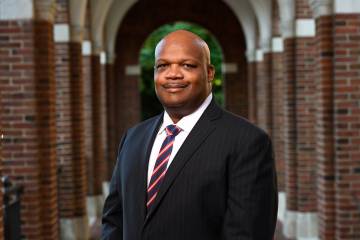Five Johns Hopkins University affiliates have been nominated to fill vacancies on the Johns Hopkins Police Accountability Board, which will help directly shape the development and operation of the future Johns Hopkins Police Department as a model of transparent, accountable, community-oriented policing.
New vice president for public safety, Branville Bard, issued the call for applications to fill five existing vacancies on the accountability board—two students, two staff, and one faculty member. The initial application period was scheduled for approximately one month, and the university extended the deadline by an additional two weeks to provide members of the community more time to complete their applications. Candidates were asked to answer a short questionnaire detailing their relevant community experience, suggestions for structuring an effective accountability board, and sharing what community policing means to them. In all, 30 completed applications were submitted.
An eight-member nominating committee led by Calvin L. Smith Jr., non-voting chair and president of the university's Black Faculty and Staff Association, then evaluated each application and developed a ranked slate of top candidates to forward to university leadership for consideration. Applicants were scored based on their commitment to the community, relevant experience, and demonstration of collaborative thinking. Names were removed from the materials so the process was blind.
"Our job was to offer an independent review of the applicants so that our stakeholders, both within the Hopkins community as well as our neighbors in the city, could feel confident in the next iteration of the accountability board," Smith said.
The following nominees will be sent to the Maryland State Senate for confirmation during the 2022 legislative session of the General Assembly, which begins Jan. 12:
- Elise Favia, Graduate student, Education, Johns Hopkins Engineering for Professionals program (Student)
- Thomas C. Judge, Executive Assistant, Department of Epidemiology, Bloomberg School of Public Health (Staff)
- Terri Massie-Burrell, Director of Student Disability Services, Johns Hopkins University, Homewood campus (Staff)
- Katie O'Conor, Fellow, Emergency Medicine-Anesthesiology Program, School of Medicine (Faculty)
- Michael Wilkinson, PhD student, Department of Mechanical Engineering, Johns Hopkins University (Student)
Members of the nominating committee reviewed and scored each application individually, then conferred as a group to make their final recommendations.
"It was a great experience to be a part of this committee," said James "JT" Timpson, director for Community Partnership and Safety at Roca Maryland and the Roca Impact Institute. "I was most pleased with the fact that the committee was very diverse but aligned in many ways around our ideas during this process."
Added nominating committee member Erin Fox, senior program manager for the university's Office of Diversity and Inclusion: "Throughout the process, Calvin created space for dissenting opinions and encouraged collaboration and robust conversation. I am grateful for his leadership and integrity."
Created by the Community Safety and Strengthening Act in 2019, the 15-member accountability board is made up of three community members unaffiliated with the university and 10 JHU students, faculty members, and staff—including at least one member of the university's Black Faculty and Staff Association—drawn from across the three campuses where the future JHPD will operate: East Baltimore, Homewood, and Peabody. The remaining two seats are appointed by Baltimore's mayor and city council president, respectively.
Accountability board members are charged with sharing community feedback with Johns Hopkins leadership, reviewing metrics involving crime, and assessing department policies, procedures, and training in order to provide recommendations for improvement, including ideas for community-based public safety initiatives. Non-student accountability board members serve for two years, while student members serve for one year and must be enrolled for the duration of their term.
Though the development of the JHPD is still on hold, Bard reconvened the accountability board last week as part of his listening tour with the Hopkins and Baltimore community. He has called the accountability board an invaluable tool for the university in ensuring that the Hopkins and Baltimore community's values and input are considered for public safety more broadly, and from the beginning of the department's creation.
More information about the accountability board can be found on the Public Safety website, which includes a form for ideas and feedback.
Posted in University News
Tagged public safety








